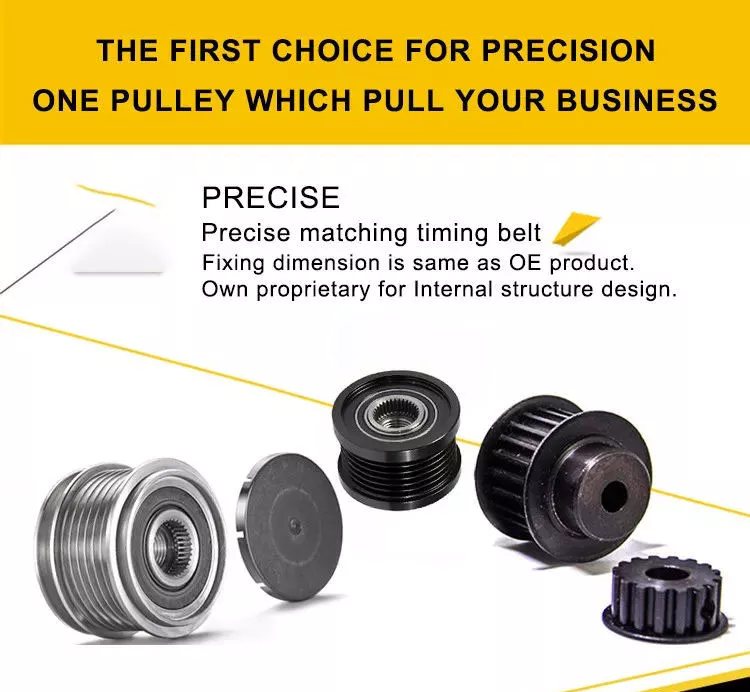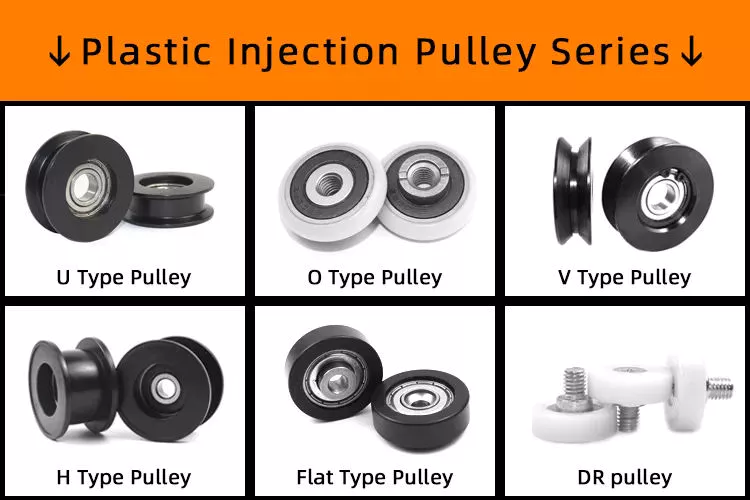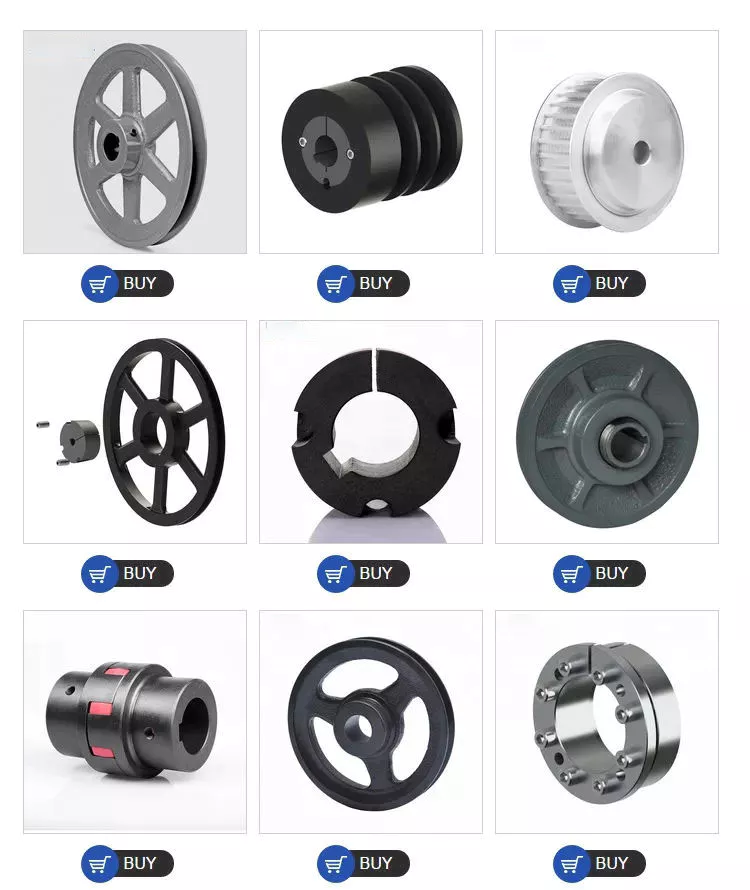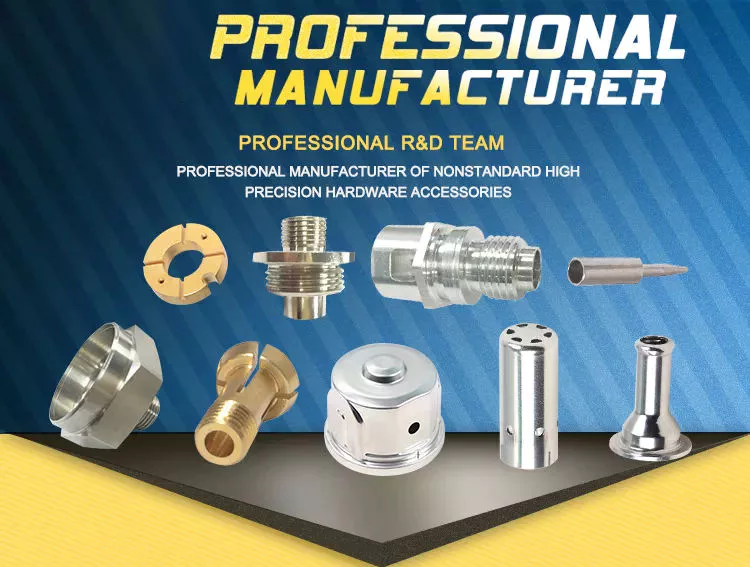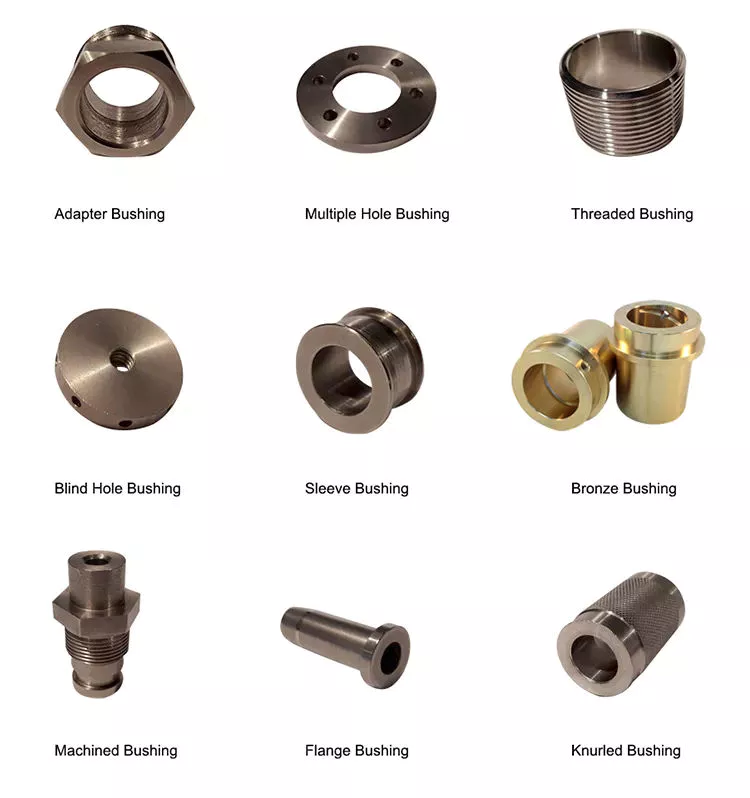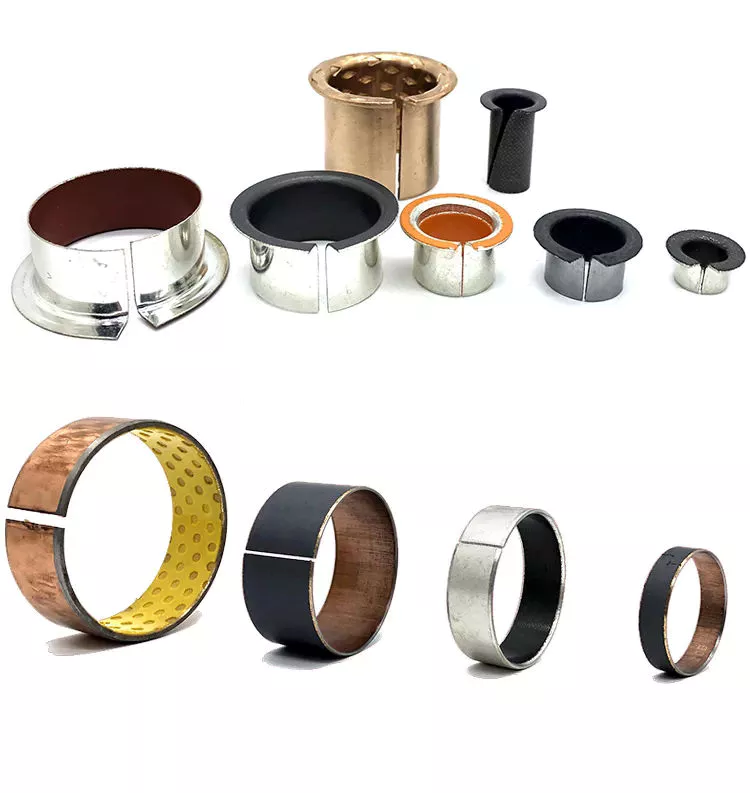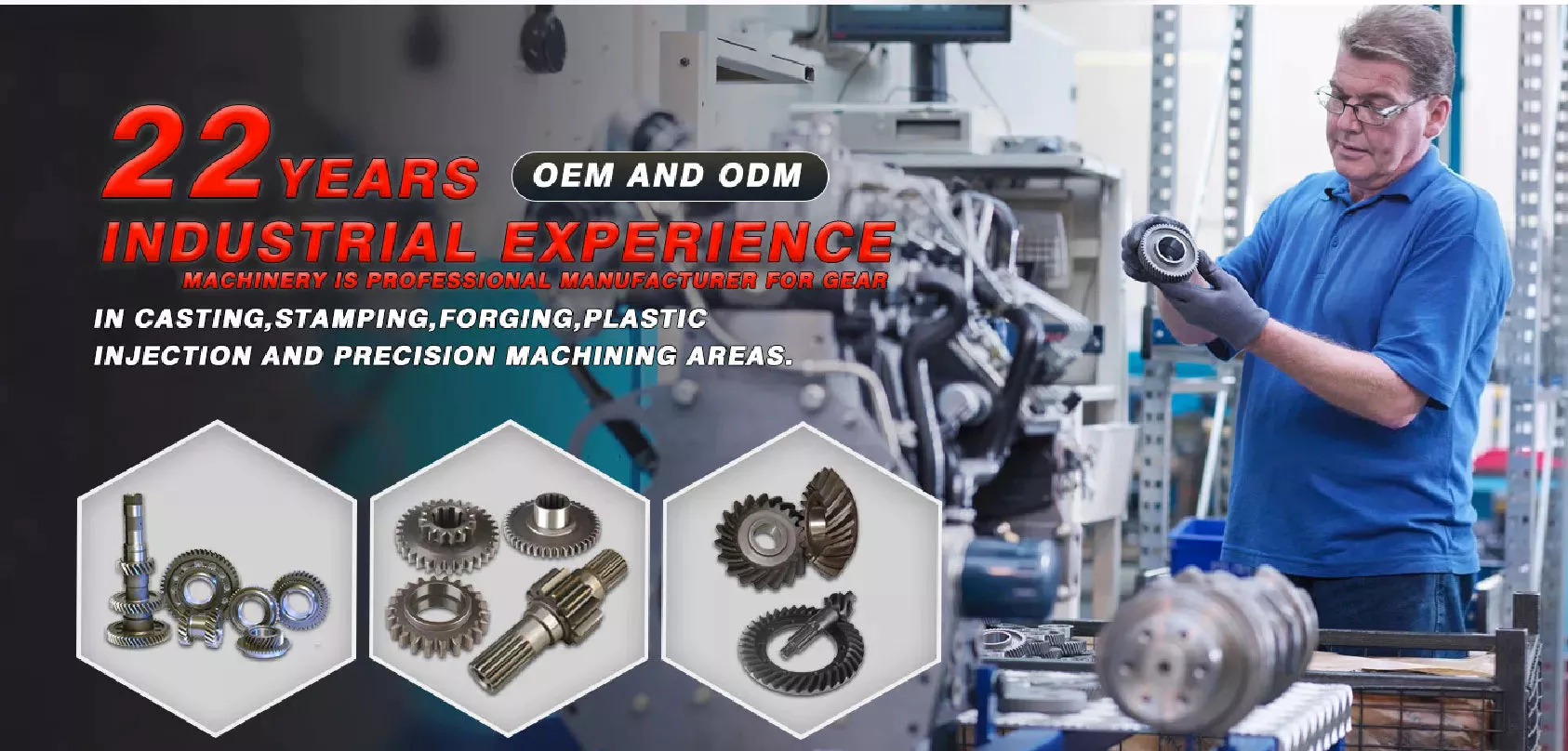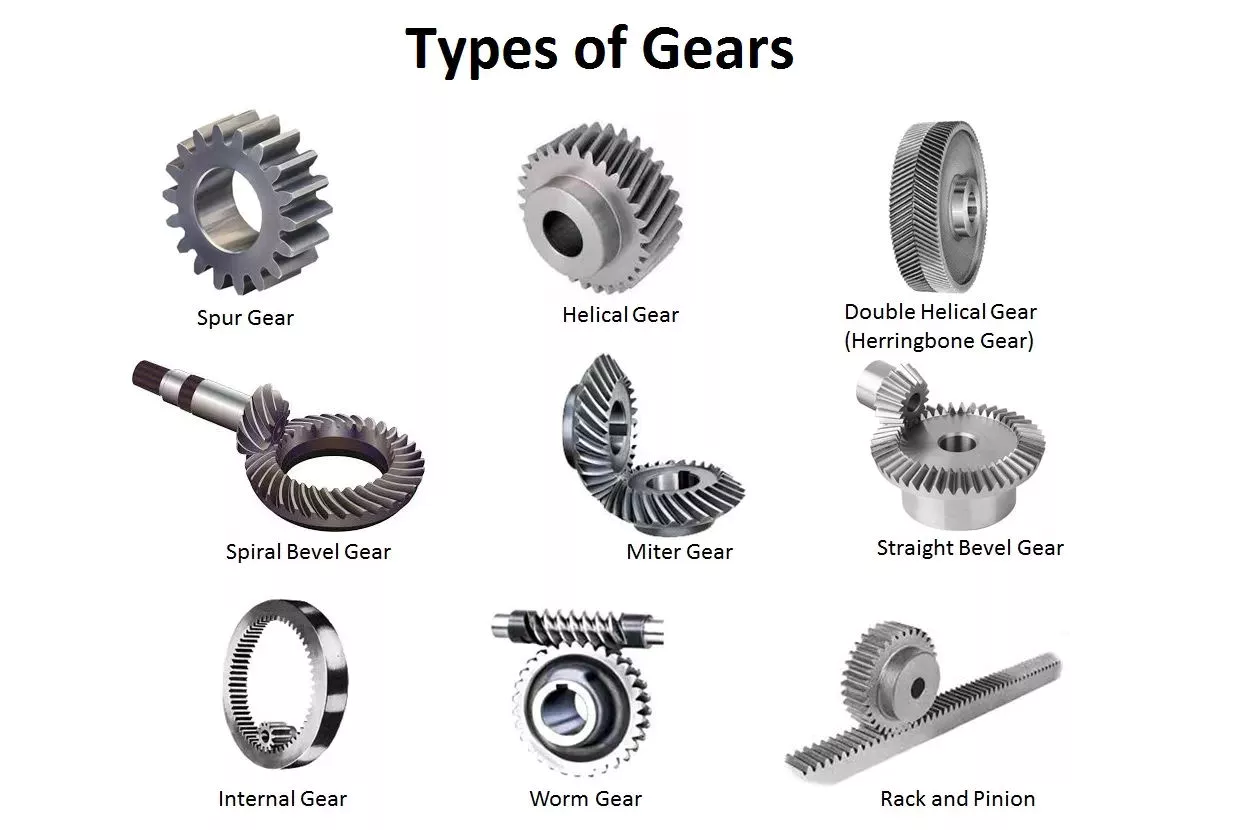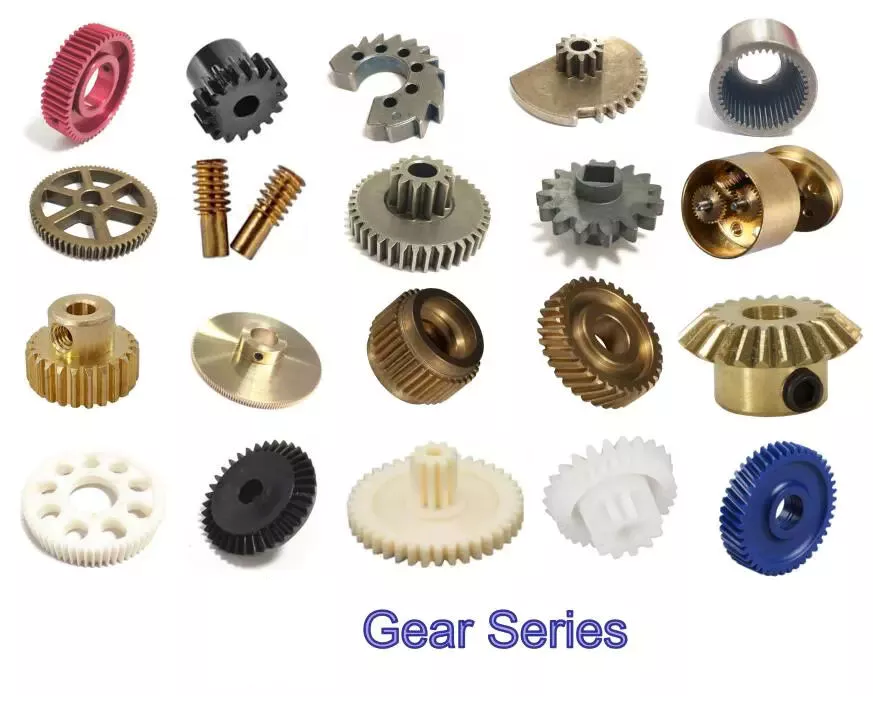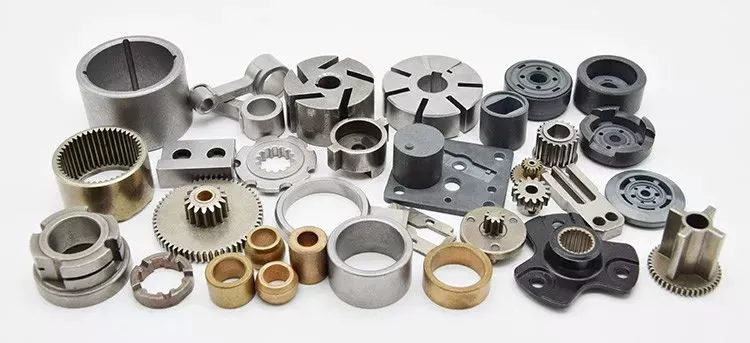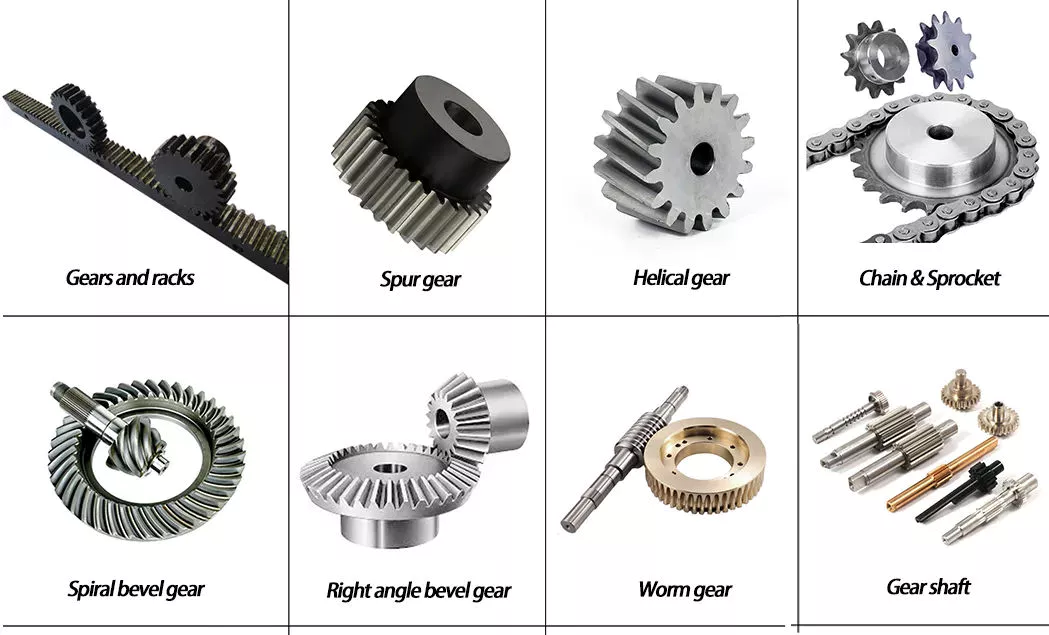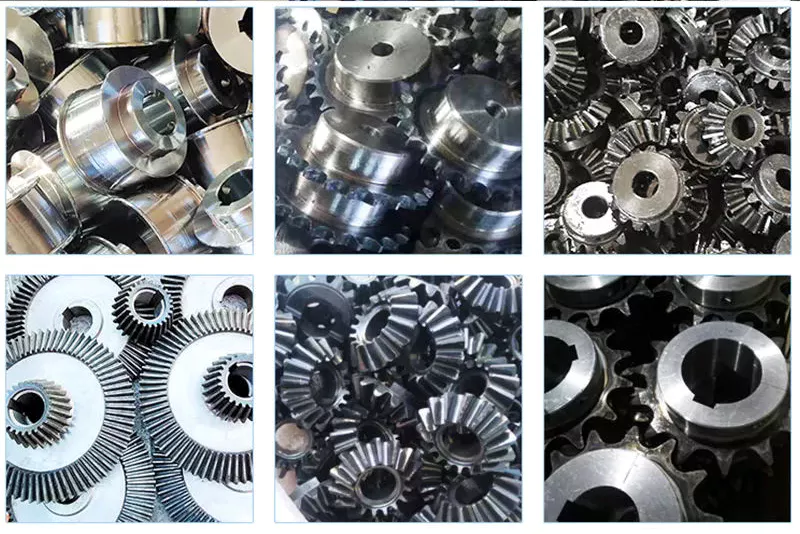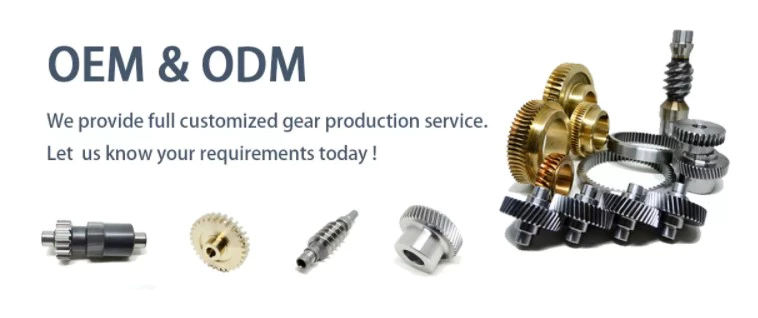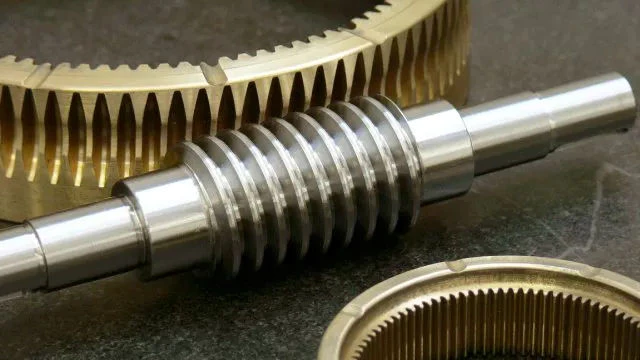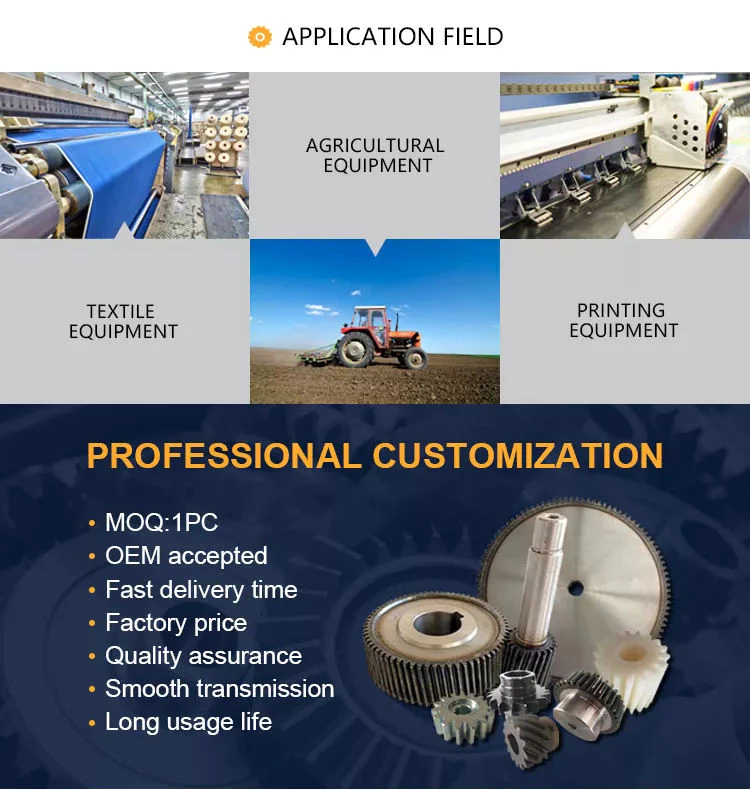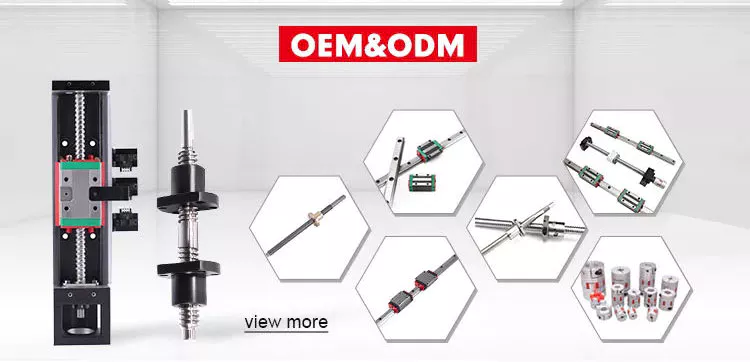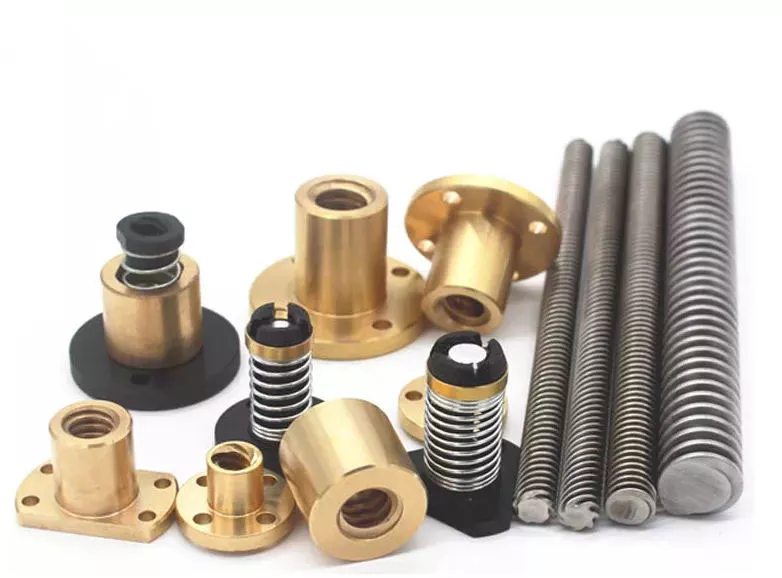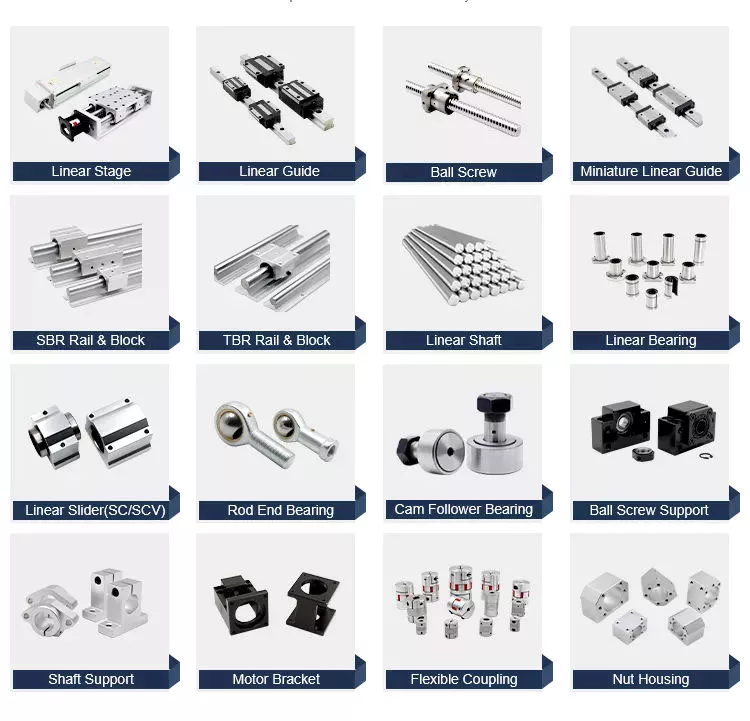Product Description
We also supply:
Company introduction:
CNC MACHINING PARTS, CNC TURNING PARTS, CNC MACHINE PART, CNC PART, WELDING PART, FORGING PART, SHEET METAL PARTS, AUTO SPARE PART, GEAR, MOTOR PART
| Customized CNC Machining Parts Information | |
| Quotation | According To Your Drawings or Samples. (Size, Material, Thickness, Processing Content And Required Technology, etc.) |
| Tolerance | +/-0.005 – 0.01mm (Customizable) |
| Surface Roughness | Ra0.2 – Ra3.2 (Customizable) |
| Materials Available | Aluminum, Copper, Brass, Stainless Steel, Titanium, Iron, Plastic, Acrylic, PE, PVC, ABS, POM, PTFE etc. |
| Surface Treatment | Polishing, Surface Chamfering, Hardening and Tempering, Nickel plating, Chrome plating, zinc plating, Laser engraving, Sandblasting, Passivating, Clear Anodized, Color Anodized, Sandblast Anodized, Chemical Film, Brushing, etc. |
| Processing | Hot/Cold forging, Heat treatment, CNC Turning, Milling, Drilling and Tapping, Surface Treatment, Laser Cutting, Stamping, Die Casting, Injection Molding, etc. |
| Testing Equipment | Coordinate Measuring Machine (CMM) / Vernier Caliper/ / Automatic Height Gauge /Hardness Tester /Surface Roughness Teste/Run-out Instrument/Optical Projector, Micrometer/ Salt spray testing machine |
| Drawing Formats | PRO/E, Auto CAD, Solid Works , UG, CAD / CAM / CAE, PDF |
| Our Advantages | 1.) 24 hours online service & quickly quote and delivery. |
| 2.) 100% quality inspection (with Quality Inspection Report) before delivery. All our products are manufactured under ISO 9001:2015. | |
| 3.) A strong, professional and reliable technical team with 16+ years of manufacturing experience. | |
| 4.) We have stable supply chain partners, including raw material suppliers, bearing suppliers, forging plants, surface treatment plants, etc. | |
| 5.) We can provide customized assembly services for those customers who have assembly needs. | |
| Available Material | |
| Stainless Steel | SS201,SS301, SS303, SS304, SS316, SS416, etc. |
| Steel | mild steel, Carbon steel, 4140, 4340, Q235, Q345B, 20#, 45#, etc. |
| Brass | HPb63, HPb62, HPb61, HPb59, H59, H62, H68, H80, etc. |
| Copper | C11000, C12000,C12000, C36000 etc. |
| Aluminum | A380, AL2571, AL6061, Al6063, AL6082, AL7075, AL5052, etc. |
| Iron | A36, 45#, 1213, 12L14, 1215 etc. |
| Plastic | ABS, PC, PE, POM, Delrin, Nylon, PP, PEI, Peek etc. |
| Others | Various types of Titanium alloy, Rubber, Bronze, etc. |
| Available Surface Treatment | |
| Stainless Steel | Polishing, Passivating, Sandblasting, Laser engraving, etc. |
| Steel | Zinc plating, Oxide black, Nickel plating, Chrome plating, Carburized, Powder Coated, etc. |
| Aluminum parts | Clear Anodized, Color Anodized, Sandblast Anodized, Chemical Film, Brushing, Polishing, etc. |
| Plastic | Plating gold(ABS), Painting, Brushing(Acylic), Laser engraving, etc. |
| Sheet Metal | Powder coated, Passivating, Anodizing, Spray paint, Electroplate, Brushed, Sand blasted, Polishing |
Product shows:
Metal Surface Finishing Services Available:
1. Anodizing (Anodized)
An electrolytic passivation process of forming a thin layer of metal oxide on the exterior of CNC machined parts to increase the thickness of the natural oxide layer, protect the metal, add various colors, as well as improve corrosion and abrasion resistance. Aluminum is the most widely anodized material, and the advantages of anodized aluminum components are well known, but many other metals can undergo the process, such as stainless steel, copper, titanium, zinc, and magnesium.
2. Passivation
A common chemical surface treatment method mostly for steel and stainless steel, to use a light coat of protective material to create a shell for enhancing the corrosion resistance or reducing the chemical reactivity. Passivation of stainless steel removes free ironand ferrous contaminants on metal surface with an acid solution to prevent rust.
3. Plating (Electroplating)
The process of using an electric current to reduce dissolved metal cations so that they form a thin coherent metal coating on an electrode, to change the properties of the metal surface or build up thickness for undersized parts. Chrome plating, nickel plating and more are often applied at CNCLATHING.
4. Painting
The process of spraying paint, pigment, or color to a solid surface as a colored protective layer, and can be done on metal or non-metal CNC machined components of any shapes, usually applied on aluminum, stainless steel and steel alloy parts. The purpose is to improve aesthetic appearance and prevent corrosion or oxidation.
5. Black Oxide (Hot Blackening)
The technique also known as blackening, or gun bluing, a chemical process of forming a black conversion coating on stainless steel, copper and copper based alloys, zinc, powdered metals, silver solder, and ferrous materials, the black oxide coating can improve corrosion resistance and minimize light reflection.
6. Polishing
Polishing, also known as buffing, a process of rubbing the surface of parts or utilizing a chemical action to produce a smooth and shiny surface, make the surface get significant specular reflection or reduce diffuse reflection in some materials.
7. Powder Coating
The process of placing a functional and decorative finish, which is applied as a free-flowing, dry powder, employs electrostatically and then cured under heat, to create a hard finish that is tougher than conventional paint. The main applications including household appliances, aluminum extrusions, drum hardware, automobile, motorcycle, and bicycle parts.
8. Heat Treatment
The process through utilizing heating or chilling usually under extreme temperatures to make the metal achieve a certain state or change some characteristics, heat treating techniques including annealing, tempering, hardening, precipitation strengthening, tempering, carburizing, normalizing and quenching.
9. Satin Finish
Apply a luster between the dull, non-shiny finish of matt materials and the bright and shiny finish of glossy finish. The visual effect is related to the lighting of the environment, satin metal finish is reflective, flat and glossy.
10. CZPT blasting (Sandblasting)
The operation of propelling a stream of CZPT material composed of high-velocity sand-sizes particles against the metal surface under high pressure with blast equipment like air pressure system, to remove surface contaminants, clean metals or increase a texture, then change the smoothness or roughness of surface.
FAQ:
Q1: How can I get the samples?
A: If you need some samples to test, you should pay for the transportation freight of samples and our samples cost, while the samples cost can be refundable after you place the order. Also, it can be the free Blank Sample.
Q2: How long can I expect to get the cosmetic packaging box sample?
A: The samples will be ready for delivery in 3-7 days. The samples will be sent via express and arrive in 3-5 days.
Q3: Can we have our Logo or company name to be printed on your products or package?
A: Sure. Your Logo can be put on your products by Hot Stamping, Printing, Embossing, UV Coating, Silk-screen Printing or Sticker.
Q4: How to order?
A: Please send us your purchase order by Email, or you can ask us to send you a Performa invoice for your order. We need to know the following information for your order.
1) Product information-Quantity, Specification ( Size, Material, Technological and Packing requirements etc.)
2) Delivery time required
3) Shipping information-Company name, Street address, Phone&Fax number, Destination sea port.
4) Forwarder’s contact details if there’s any in China.
Q5: When can you get the price?
We usually quote within 24 hours after we get your inquiry. If you are very urgent to get the price, please call us or tell us in your email so that we will regard your inquiry priority. Kindly note that if your inquiry is with more details then the price we quote will be more accurate.
Q6: How can you get a sample to check our quality?
After price confirmation, you can require for samples to check our quality.
If you just need a blank sample to check the design and paper quality, we will provide you sample for free, as long as you afford the express freight.
Q7: What kind of files do we accept for printing?
AI, PDF, EPS, TIF, high resolution JPG
Q8: Can we do the design for you?
Yes. We have a professional team having rich experience in gift box design and manufacturing. Just tell us your ideas and we will help to carry out your ideas into perfect gift boxes. It does not matter if you do not have someone to complete files. Send us high resolution images, your Logo and text and tell us how you would like to arrange them. We will send you finished files for confirmation.
Q9: What about the lead time for mass production?
Honestly, it depends on the order quantity and the season you place the order. The best record we keep is delivering 20, 000 gift boxes within a week. Generally speaking, we suggest that you start inquiry 2 months before the date you would like to get the products at your country.
Q10: What is our terms of delivery?
We accept EXW, FOB, CFR, CIF, DDU, DDP, etc. You can choose the 1 which is the most convenient or cost effective for you.
Q11: What are the Benefits of Metal Finishing Process?
The functions of metal surface treatment can be summarized as follows:
– Improve the appearance – Add specific beautiful colors
– Change the luster – Enhance chemical resistance
– Increase wear resistance – Limit effects of corrosion
– Reduce friction – Remove surface defects
– Cleaning the parts – Serve as a primer coat
– Adjust the sizes
Q12: What is Metal Machining?
The process of removing raw materials from a block and creating a part with the desired shape and size while using computer numerical controlled machine tools is known as CNC machining. Metal machining performs different types of CNC machining techniques on machines tools to process various metal materials, such as brass, steel, aluminum, etc. Metals are ideal choices for CNC milling, turning, and drilling because of their great mechanical properties, including strength, hardness, resistance, and durability, but different types of metals differ much in their machinability, which affects their uses in CNC factories.
Q13: What Metals Are Used in CNC Machining?
CNC machining is a great option to make metal parts with high precision and accuracy, what metals can be machined with CNC machines?
Aluminum: aluminum is probably the most widely used CNC milling material. The high machining speed of CNC aluminum machining makes aluminum a more useful material for CNC manufacturing. Aluminum is widely used in the production of aircraft parts, automobile parts, bicycle frames, and food containers because of its lightweight, non-magnetic, corrosion resistance, and low price.
Stainless steel: stainless steel alloys are not affected by most stains and rust. The material is favored for its strength and corrosion resistance and can be used in anything from surgical equipment to electronic hardware. Stainless steel is a widely used CNC machining material, which is strong and durable, expanding its application in various industries.
Carbon steel: carbon steel is also 1 of the popular materials used in CNC machining. It has a variety of types to choose from depending on your application requirements. Due to its durability, safety, long shelf life, economic and environmental protection, the material is mainly used for CNC metal machining.
Brass: brass is widely regarded as 1 of the easiest and most cost-effective materials for precision machining services. It is selected to manufacture complex parts requiring complicated functions. Brass is easy to process, smooth and clean. It can be used to manufacture medical equipment, consumer goods, electronic hardware and contacts, accessories, commercial products, etc.
Titanium: titanium is heat-resistant and corrosion-resistant, which makes it a feasible choice for many industrial applications. Titanium is not affected by salt and water. It is widely used in the manufacture of medical implants, aircraft parts, and jewelry.
Magnesium: magnesium is the lightest structural metal widely used by precision machining service providers. Magnesium has excellent machinability, strength, and robustness, which makes it very suitable for many industrial applications.
Q14: What are the main products?
Key words: auto part, car part, oreillys, autozone near me, eurocar parts, advanceautoparts, napa autoparts, oreilly autoparts, oreilly automotive inc, car accessories, car seat covers, car cover, car sun shade, battery car charger, vertical machining center, machining on lathe, brake pad, car accessory, cnc machining, oriellys, auto parts near me, cnc, auto parts store near me, oreilys, advance auto parts near me, orileys, junkyard near me, oreillys near me, rock auto parts, car seat covers, salvage yards near me, autoparts, car cleaning kit, car parts near me, orileys auto parts, fuel pump, auto parts store, seat covers, auto store near me, junk yards, car cover, parts store near me, salvage yards, oreilly auto, advanceauto, car sun shade, weather tech floor mats, oreilly near me, hondaparts, car bumpers, vertical machining, center, diff car, lathe machining, crankshaft, camshaft, cylinder block, carburettors, sheet metal, stamping, jsw steel, sheet price, bushing, cnc milling, auto accessory, car accessories near me, car mats, car accessories shop near me, car decals, car floor mats, cnc milling machine, die cast, car seat cushion, car seat protector, car gadgets, led lights for cars, car roof rack, car dashboard accessories, weathertech car mats, best car accessories, car interior accessories, cool car accessories, car cup holder, car decor, car roof box, car door protector, sun visor car, car accessories shop, nickel plating, leather car seat covers, metal casting, waterproof car cover, zinc plating, car window sun shade, gas tungsten arc welding, car hanging accessories, deep drawing, car hitch, dmls, car curtains, metal cutting, remote starter for car, rubber bushing, interior lights for car, copper plating, car accessories store, brake replacement, welding aluminium, car window cover, led lights for car interior, electro plating, cigarette lighter car, tin plating, car racks, aluminum casting, car seat cover near me, caliper car, chromium plating, sheet metal bending, car keychains, laser cut metal, steel cutting, car organizers and so on.
| Condition: | New |
|---|---|
| Certification: | CE, RoHS, ISO9001 |
| Standard: | DIN, ASTM, JIS |
| Customized: | Customized |
| Material: | Stainless Steel |
| Application: | Metal Recycling Machine, Metal Cutting Machine, Metal Straightening Machinery, Metal Spinning Machinery, Metal Processing Machinery Parts, Metal forging Machinery, Metal Engraving Machinery, Metal Coating Machinery, Metal Casting Machinery |
###
| Samples: |
US$ 0/Piece
1 Piece(Min.Order) |
|---|
###
| Customization: |
Available
|
|---|
###
| Customized CNC Machining Parts Information | |
| Quotation | According To Your Drawings or Samples. (Size, Material, Thickness, Processing Content And Required Technology, etc.) |
| Tolerance | +/-0.005 – 0.01mm (Customizable) |
| Surface Roughness | Ra0.2 – Ra3.2 (Customizable) |
| Materials Available | Aluminum, Copper, Brass, Stainless Steel, Titanium, Iron, Plastic, Acrylic, PE, PVC, ABS, POM, PTFE etc. |
| Surface Treatment | Polishing, Surface Chamfering, Hardening and Tempering, Nickel plating, Chrome plating, zinc plating, Laser engraving, Sandblasting, Passivating, Clear Anodized, Color Anodized, Sandblast Anodized, Chemical Film, Brushing, etc. |
| Processing | Hot/Cold forging, Heat treatment, CNC Turning, Milling, Drilling and Tapping, Surface Treatment, Laser Cutting, Stamping, Die Casting, Injection Molding, etc. |
| Testing Equipment | Coordinate Measuring Machine (CMM) / Vernier Caliper/ / Automatic Height Gauge /Hardness Tester /Surface Roughness Teste/Run-out Instrument/Optical Projector, Micrometer/ Salt spray testing machine |
| Drawing Formats | PRO/E, Auto CAD, Solid Works , UG, CAD / CAM / CAE, PDF |
| Our Advantages | 1.) 24 hours online service & quickly quote and delivery. |
| 2.) 100% quality inspection (with Quality Inspection Report) before delivery. All our products are manufactured under ISO 9001:2015. | |
| 3.) A strong, professional and reliable technical team with 16+ years of manufacturing experience. | |
| 4.) We have stable supply chain partners, including raw material suppliers, bearing suppliers, forging plants, surface treatment plants, etc. | |
| 5.) We can provide customized assembly services for those customers who have assembly needs. | |
| Available Material | |
| Stainless Steel | SS201,SS301, SS303, SS304, SS316, SS416, etc. |
| Steel | mild steel, Carbon steel, 4140, 4340, Q235, Q345B, 20#, 45#, etc. |
| Brass | HPb63, HPb62, HPb61, HPb59, H59, H62, H68, H80, etc. |
| Copper | C11000, C12000,C12000, C36000 etc. |
| Aluminum | A380, AL2024, AL6061, Al6063, AL6082, AL7075, AL5052, etc. |
| Iron | A36, 45#, 1213, 12L14, 1215 etc. |
| Plastic | ABS, PC, PE, POM, Delrin, Nylon, PP, PEI, Peek etc. |
| Others | Various types of Titanium alloy, Rubber, Bronze, etc. |
| Available Surface Treatment | |
| Stainless Steel | Polishing, Passivating, Sandblasting, Laser engraving, etc. |
| Steel | Zinc plating, Oxide black, Nickel plating, Chrome plating, Carburized, Powder Coated, etc. |
| Aluminum parts | Clear Anodized, Color Anodized, Sandblast Anodized, Chemical Film, Brushing, Polishing, etc. |
| Plastic | Plating gold(ABS), Painting, Brushing(Acylic), Laser engraving, etc. |
| Sheet Metal | Powder coated, Passivating, Anodizing, Spray paint, Electroplate, Brushed, Sand blasted, Polishing |
| Condition: | New |
|---|---|
| Certification: | CE, RoHS, ISO9001 |
| Standard: | DIN, ASTM, JIS |
| Customized: | Customized |
| Material: | Stainless Steel |
| Application: | Metal Recycling Machine, Metal Cutting Machine, Metal Straightening Machinery, Metal Spinning Machinery, Metal Processing Machinery Parts, Metal forging Machinery, Metal Engraving Machinery, Metal Coating Machinery, Metal Casting Machinery |
###
| Samples: |
US$ 0/Piece
1 Piece(Min.Order) |
|---|
###
| Customization: |
Available
|
|---|
###
| Customized CNC Machining Parts Information | |
| Quotation | According To Your Drawings or Samples. (Size, Material, Thickness, Processing Content And Required Technology, etc.) |
| Tolerance | +/-0.005 – 0.01mm (Customizable) |
| Surface Roughness | Ra0.2 – Ra3.2 (Customizable) |
| Materials Available | Aluminum, Copper, Brass, Stainless Steel, Titanium, Iron, Plastic, Acrylic, PE, PVC, ABS, POM, PTFE etc. |
| Surface Treatment | Polishing, Surface Chamfering, Hardening and Tempering, Nickel plating, Chrome plating, zinc plating, Laser engraving, Sandblasting, Passivating, Clear Anodized, Color Anodized, Sandblast Anodized, Chemical Film, Brushing, etc. |
| Processing | Hot/Cold forging, Heat treatment, CNC Turning, Milling, Drilling and Tapping, Surface Treatment, Laser Cutting, Stamping, Die Casting, Injection Molding, etc. |
| Testing Equipment | Coordinate Measuring Machine (CMM) / Vernier Caliper/ / Automatic Height Gauge /Hardness Tester /Surface Roughness Teste/Run-out Instrument/Optical Projector, Micrometer/ Salt spray testing machine |
| Drawing Formats | PRO/E, Auto CAD, Solid Works , UG, CAD / CAM / CAE, PDF |
| Our Advantages | 1.) 24 hours online service & quickly quote and delivery. |
| 2.) 100% quality inspection (with Quality Inspection Report) before delivery. All our products are manufactured under ISO 9001:2015. | |
| 3.) A strong, professional and reliable technical team with 16+ years of manufacturing experience. | |
| 4.) We have stable supply chain partners, including raw material suppliers, bearing suppliers, forging plants, surface treatment plants, etc. | |
| 5.) We can provide customized assembly services for those customers who have assembly needs. | |
| Available Material | |
| Stainless Steel | SS201,SS301, SS303, SS304, SS316, SS416, etc. |
| Steel | mild steel, Carbon steel, 4140, 4340, Q235, Q345B, 20#, 45#, etc. |
| Brass | HPb63, HPb62, HPb61, HPb59, H59, H62, H68, H80, etc. |
| Copper | C11000, C12000,C12000, C36000 etc. |
| Aluminum | A380, AL2024, AL6061, Al6063, AL6082, AL7075, AL5052, etc. |
| Iron | A36, 45#, 1213, 12L14, 1215 etc. |
| Plastic | ABS, PC, PE, POM, Delrin, Nylon, PP, PEI, Peek etc. |
| Others | Various types of Titanium alloy, Rubber, Bronze, etc. |
| Available Surface Treatment | |
| Stainless Steel | Polishing, Passivating, Sandblasting, Laser engraving, etc. |
| Steel | Zinc plating, Oxide black, Nickel plating, Chrome plating, Carburized, Powder Coated, etc. |
| Aluminum parts | Clear Anodized, Color Anodized, Sandblast Anodized, Chemical Film, Brushing, Polishing, etc. |
| Plastic | Plating gold(ABS), Painting, Brushing(Acylic), Laser engraving, etc. |
| Sheet Metal | Powder coated, Passivating, Anodizing, Spray paint, Electroplate, Brushed, Sand blasted, Polishing |
Screw Shaft Features Explained
When choosing the screw shaft for your application, you should consider the features of the screws: threads, lead, pitch, helix angle, and more. You may be wondering what these features mean and how they affect the screw’s performance. This article explains the differences between these factors. The following are the features that affect the performance of screws and their properties. You can use these to make an informed decision and purchase the right screw. You can learn more about these features by reading the following articles.
Threads
The major diameter of a screw thread is the larger of the two extreme diameters. The major diameter of a screw is also known as the outside diameter. This dimension can’t be directly measured, but can be determined by measuring the distance between adjacent sides of the thread. In addition, the mean area of a screw thread is known as the pitch. The diameter of the thread and pitch line are directly proportional to the overall size of the screw.
The threads are classified by the diameter and pitch. The major diameter of a screw shaft has the largest number of threads; the smaller diameter is called the minor diameter. The thread angle, also known as the helix angle, is measured perpendicular to the axis of the screw. The major diameter is the largest part of the screw; the minor diameter is the lower end of the screw. The thread angle is the half distance between the major and minor diameters. The minor diameter is the outer surface of the screw, while the top surface corresponds to the major diameter.
The pitch is measured at the crest of a thread. In other words, a 16-pitch thread has a diameter of one sixteenth of the screw shaft’s diameter. The actual diameter is 0.03125 inches. Moreover, a large number of manufacturers use this measurement to determine the thread pitch. The pitch diameter is a critical factor in successful mating of male and female threads. So, when determining the pitch diameter, you need to check the thread pitch plate of a screw.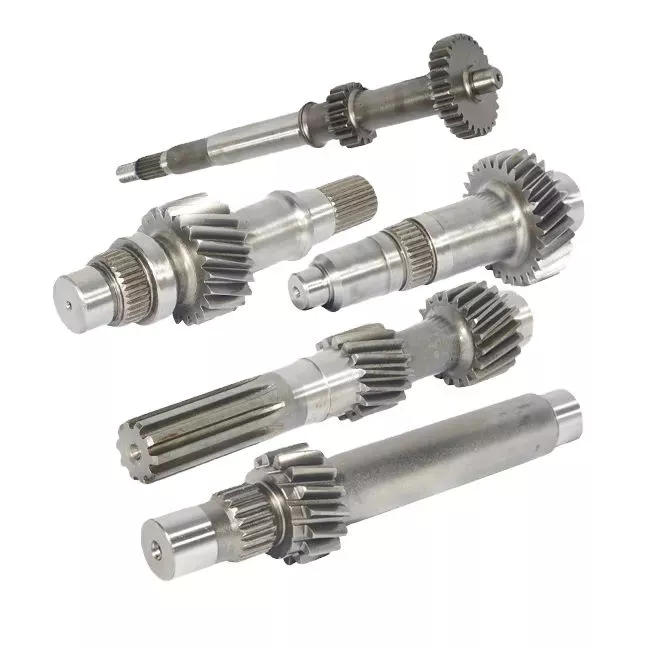
Lead
In screw shaft applications, a solid, corrosion-resistant material is an important requirement. Lead screws are a robust choice, which ensure shaft direction accuracy. This material is widely used in lathes and measuring instruments. They have black oxide coatings and are suited for environments where rusting is not acceptable. These screws are also relatively inexpensive. Here are some advantages of lead screws. They are highly durable, cost-effective, and offer high reliability.
A lead screw system may have multiple starts, or threads that run parallel to each other. The lead is the distance the nut travels along the shaft during a single revolution. The smaller the lead, the tighter the thread. The lead can also be expressed as the pitch, which is the distance between adjacent thread crests or troughs. A lead screw has a smaller pitch than a nut, and the smaller the lead, the greater its linear speed.
When choosing lead screws, the critical speed is the maximum number of revolutions per minute. This is determined by the minor diameter of the shaft and its length. The critical speed should never be exceeded or the lead will become distorted or cracked. The recommended operational speed is around eighty percent of the evaluated critical speed. Moreover, the lead screw must be properly aligned to avoid excessive vibrations. In addition, the screw pitch must be within the design tolerance of the shaft.
Pitch
The pitch of a screw shaft can be viewed as the distance between the crest of a thread and the surface where the threads meet. In mathematics, the pitch is equivalent to the length of one wavelength. The pitch of a screw shaft also relates to the diameter of the threads. In the following, the pitch of a screw is explained. It is important to note that the pitch of a screw is not a metric measurement. In the following, we will define the two terms and discuss how they relate to one another.
A screw’s pitch is not the same in all countries. The United Kingdom, Canada, and the United States have standardized screw threads according to the UN system. Therefore, there is a need to specify the pitch of a screw shaft when a screw is being manufactured. The standardization of pitch and diameter has also reduced the cost of screw manufacturing. Nevertheless, screw threads are still expensive. The United Kingdom, Canada, and the United States have introduced a system for the calculation of screw pitch.
The pitch of a lead screw is the same as that of a lead screw. The diameter is 0.25 inches and the circumference is 0.79 inches. When calculating the mechanical advantage of a screw, divide the diameter by its pitch. The larger the pitch, the more threads the screw has, increasing its critical speed and stiffness. The pitch of a screw shaft is also proportional to the number of starts in the shaft.
Helix angle
The helix angle of a screw shaft is the angle formed between the circumference of the cylinder and its helix. Both of these angles must be equal to 90 degrees. The larger the lead angle, the smaller the helix angle. Some reference materials refer to angle B as the helix angle. However, the actual angle is derived from calculating the screw geometry. Read on for more information. Listed below are some of the differences between helix angles and lead angles.
High helix screws have a long lead. This length reduces the number of effective turns of the screw. Because of this, fine pitch screws are usually used for small movements. A typical example is a 16-mm x 5-inch screw. Another example of a fine pitch screw is a 12x2mm screw. It is used for small moves. This type of screw has a lower lead angle than a high-helix screw.
A screw’s helix angle refers to the relative angle of the flight of the helix to the plane of the screw axis. While screw helix angles are not often altered from the standard square pitch, they can have an effect on processing. Changing the helix angle is more common in two-stage screws, special mixing screws, and metering screws. When a screw is designed for this function, it should be able to handle the materials it is made of.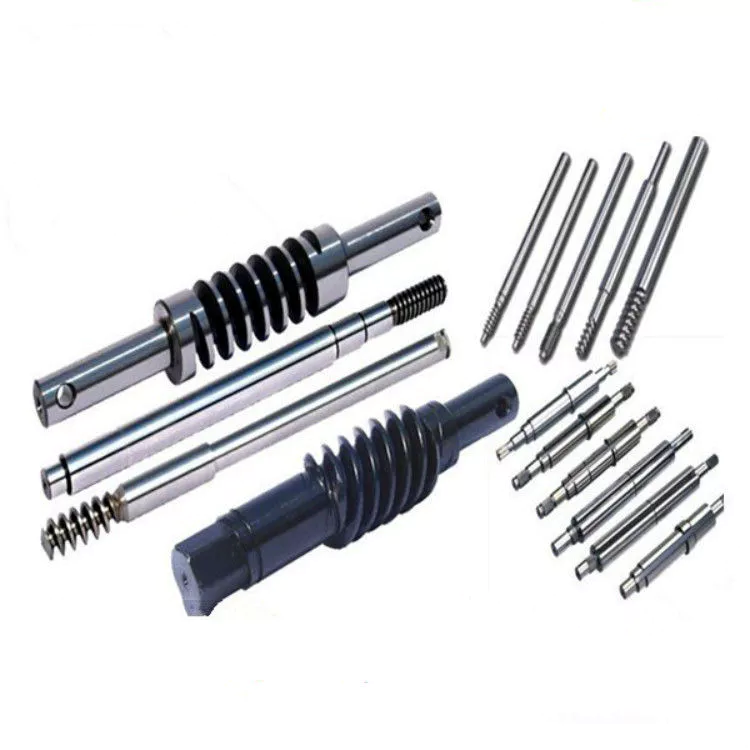
Size
The diameter of a screw is its diameter, measured from the head to the shaft. Screw diameters are standardized by the American Society of Mechanical Engineers. The diameters of screws range from 3/50 inches to sixteen inches, and more recently, fractions of an inch have been added. However, shaft diameters may vary depending on the job, so it is important to know the right size for the job. The size chart below shows the common sizes for screws.
Screws are generally referred to by their gauge, which is the major diameter. Screws with a major diameter less than a quarter of an inch are usually labeled as #0 to #14 and larger screws are labeled as sizes in fractions of an inch. There are also decimal equivalents of each screw size. These measurements will help you choose the correct size for your project. The screws with the smaller diameters were not tested.
In the previous section, we described the different shaft sizes and their specifications. These screw sizes are usually indicated by fractions of an inch, followed by a number of threads per inch. For example, a ten-inch screw has a shaft size of 2” with a thread pitch of 1/4″, and it has a diameter of two inches. This screw is welded to a two-inch Sch. 40 pipe. Alternatively, it can be welded to a 9-inch O.A.L. pipe.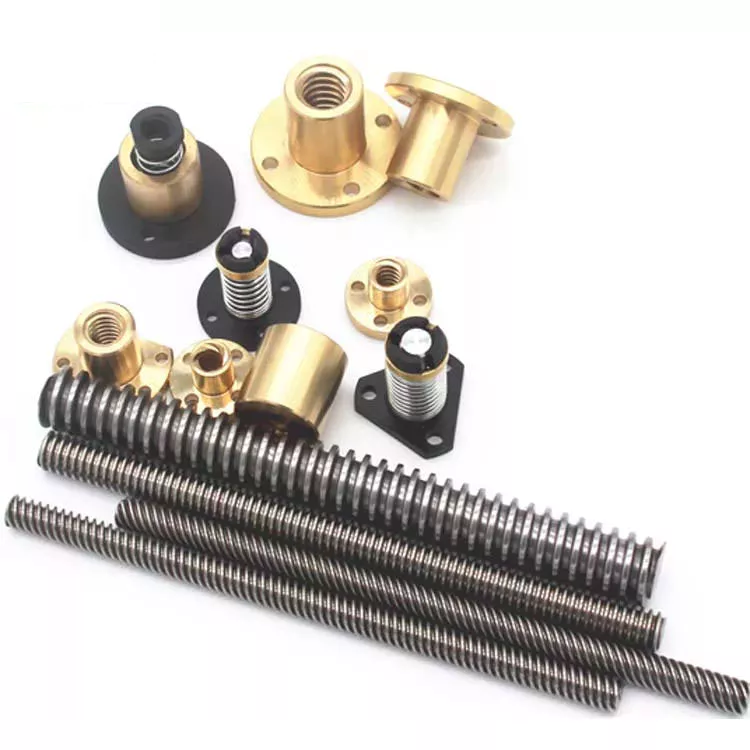
Shape
Screws come in a wide variety of sizes and shapes, from the size of a quarter to the diameter of a U.S. quarter. Screws’ main function is to hold objects together and to translate torque into linear force. The shape of a screw shaft, if it is round, is the primary characteristic used to define its use. The following chart shows how the screw shaft differs from a quarter:
The shape of a screw shaft is determined by two features: its major diameter, or distance from the outer edge of the thread on one side to the inner smooth surface of the shaft. These are generally two to sixteen millimeters in diameter. Screw shafts can have either a fully threaded shank or a half-threaded shank, with the latter providing better stability. Regardless of whether the screw shaft is round or domed, it is important to understand the different characteristics of a screw before attempting to install it into a project.
The screw shaft’s diameter is also important to its application. The ball circle diameter refers to the distance between the center of two opposite balls in contact with the grooves. The root diameter, on the other hand, refers to the distance between the bottommost grooves of the screw shaft. These are the two main measurements that define the screw’s overall size. Pitch and nominal diameter are important measurements for a screw’s performance in a particular application.
Lubrication
In most cases, lubrication of a screw shaft is accomplished with grease. Grease is made up of mineral or synthetic oil, thickening agent, and additives. The thickening agent can be a variety of different substances, including lithium, bentonite, aluminum, and barium complexes. A common classification for lubricating grease is NLGI Grade. While this may not be necessary when specifying the type of grease to use for a particular application, it is a useful qualitative measure.
When selecting a lubricant for a screw shaft, the operating temperature and the speed of the shaft determine the type of oil to use. Too much oil can result in heat buildup, while too little can lead to excessive wear and friction. The proper lubrication of a screw shaft directly affects the temperature rise of a ball screw, and the life of the assembly. To ensure the proper lubrication, follow the guidelines below.
Ideally, a low lubrication level is appropriate for medium-sized feed stuff factories. High lubrication level is appropriate for larger feed stuff factories. However, in low-speed applications, the lubrication level should be sufficiently high to ensure that the screws run freely. This is the only way to reduce friction and ensure the longest life possible. Lubrication of screw shafts is an important consideration for any screw.


editor by czh 2022-11-24
